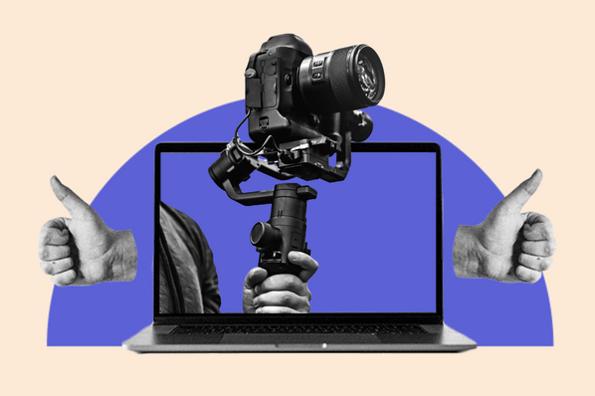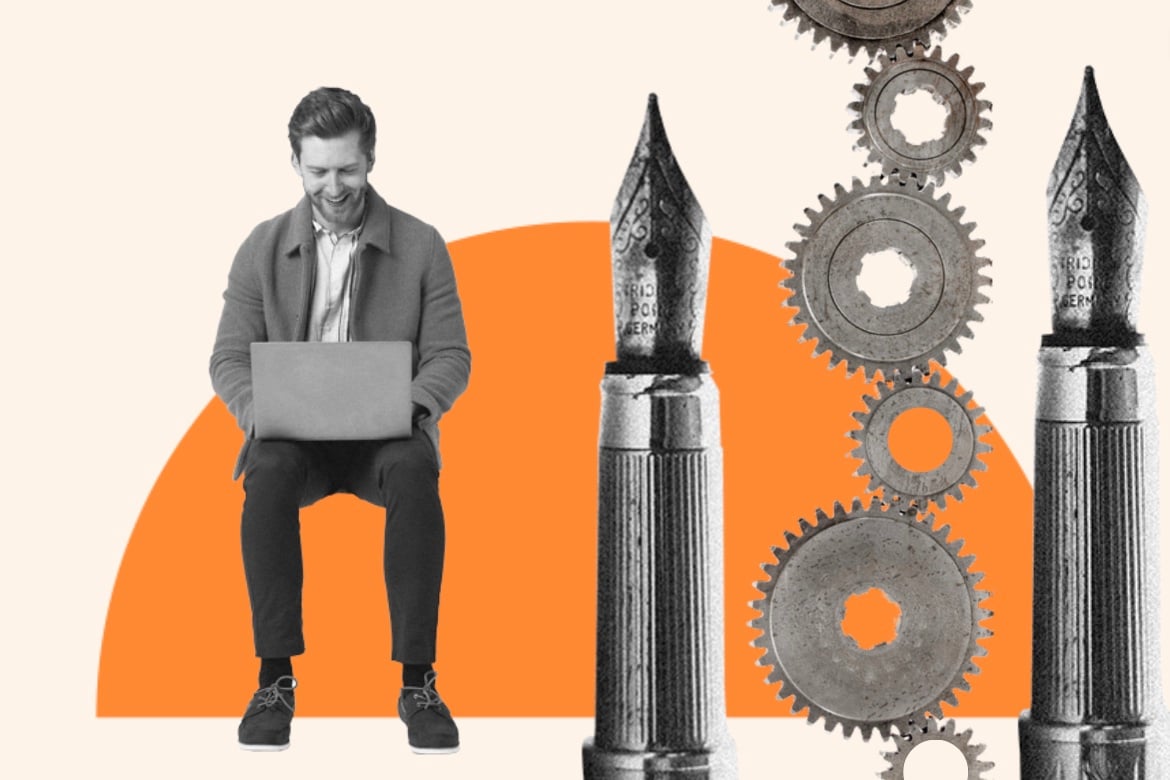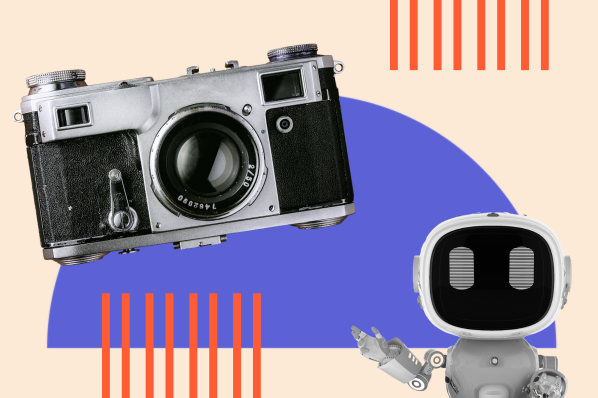Video has become a cornerstone of modern marketing, landing front-and-center in many marketing strategies.

Yet, despite being an ROI powerhouse and top lead generator, video is a hard medium to pull off.
To state the obvious, video creation isn't quick. On average, it takes marketers two weeks to create a video from start to finish.
But what if there was a way to streamline the process — to quickly come up with ideas and execute them in a fraction of the time?
The solution could be here already, and it's with artificial intelligence.
Here, I spoke with Chris Lavigne, Head of Production at Wistia, to learn how AI is changing the way we create videos, and how it can power your next marketing video.
How AI is Changing Video Marketing
Imagine creating a video without writing a script or picking up a camera.
Thanks to new artificial intelligence (AI) and machine learning (ML) tools, it's not only possible, it's already happening.
Generative AI uses existing content like audio, video, and text to generate original content. In this case, video marketers can automate many stages of the process — like scripting, editing, and transcription — in a matter of seconds.
The ability to create videos in record time is an obvious benefit of using AI. But for Lavigne, it's more than just saving time. It also has the potential to push the creative envelope.
"For me, AI is opening the door to new ideas, new executions, and new visuals that I may not have come up with on my own. It's expanding my creative palette, not just saving me time," he told me.

For instance, Lavigne and his team at Wistia created a video almost entirely powered by AI.
The process began with Lavigne opening up ChatGPT, an AI-powered chatbot, to generate a 60-second script about how to make an apple pie in the style of a YouTube video. He then uses AI software Synthesia to create a human avatar of himself to read the script.
To top it off, he adds a few final touches with visuals and b-roll. Here's the end result:
Let's take a look at more ways you can use AI in the video creation process.
How AI Can Power Your Next Video
1. Ideation and Script Writing
For most video marketers, the hardest part of the process is coming up with a great idea, followed by a compelling script.
For Lavigne, using AI for scriptwriting has been a game-changer. Specifically, he uses ChatGPT to create a framework.
"I can input a prompt and get an incredible starting point to take me from zero to 100. I can input how long I want the video to be, how detailed I want it to be, and what style of video I want it to be. The results are quite remarkable when you prompt it with the right things," he told me.
For example, you can prompt ChatGPT to write an ad in the style of an info-mercial or a TikTok video. You can even request a specific tone, such as funny or academic.
-Mar-17-2023-03-54-44-4061-PM.gif?width=517&height=517&name=giphy%20(1)-Mar-17-2023-03-54-44-4061-PM.gif)
However, Lavigne is quick to caution against simply copying and pasting AI-generated content.
"AI can give you a rough edit, but you still need to add your perspective, personality, or brand touch. It's not as simple as inputing a prompt and pasting the output into your marketing efforts. You're missing a huge opportunity if you treat AI in that regard," he says.
2. Video Editing
At Wistia, Lavigne has been exploring different AI tools in the post-production stage.
One of these tools is Runway Al, which can quickly remove objects from the background of a video. Historically, this would be a time-consuming process that involves moving frame-by-frame to trace it out. Now, AI can do the heavy lifting.
Another tool Lavigne uses is Descript, which transcribes raw footage into text within minutes. This allows him to edit and rearrange video content without the need to constantly pause and rewind.
Turning raw footage into a final product takes a lot of time — but AI tools can streamline the process.
As Lavigne puts it, "When you find the use case that you can use this software for, it blows your mind how much time you can possibly save. It gets me excited for where these tools are going in the future."
3. Video Production
While artificial intelligence is remarkable, it does have its limitations in terms of video production.
Lavigne gives the example of human avatars. Yes, they look like humans. They talk like humans. But they're not human enough to be believable.
He told me, "There's no substitute for shooting a real human being. AI has yet to replicate the image or likeness of humans, or the emotions they have on their face. That's not to say it will never change. But currently, it's a huge limitation in the world of production."
This leads us to an important point: AI is not a perfect solution for everything. While it can assist in other areas in the production stage — like creating B-roll — you need to know when to use this technology, and when it's better to do things the old-fashioned way.
What AI Can't Do For Video Creators
Almost 70% of decisions are based on emotion. In video marketing, you have to visually appeal to people's emotions to make an impact.
The problem?
AI can mimic human intelligence, but human creativity isn't as easy.
"It's almost instinctual for a great editor to understand beats, pacing, camera movements, and what music can best elevate a scene at a certain time. All of these pieces are rooted in the creative and personal decisions by the storyteller. There's no substitute for that," Lavigne observes.

As a consequence, Lavigne predicts that we'll see an influx of generic, mediocre content generated by AI in the near future. However, he also sees this as an opportunity for video marketers to showcase their creativity and stand out from the crowd.
He adds, "Now is the time for video marketers to put their creative fingerprints over their work. That's how you'll stand apart."
Is AI the Future of Video Creation?
Almost every emerging technology is met with some skepticism, and AI is no exception. For instance, could it eventually replace video marketers entirely?
Fortunately, Lavigne isn't so convinced. He draws a parallel to the advent of photography, which some believed was the death of traditional art forms.
He says, "The reaction to AI is similar to the arrival of a bunch of different technologies, like photography. If you can just photograph something, why do you need an artist to paint it? In reality, that's not quite what happened."
"We're going to treat AI as a similar thing. It's going to change the industry, but it won't replace video creators," he adds.
While AI may not replace you, Lavigne argues that the video marketer who uses AI will have an upper-hand. Therefore, video marketers should approach AI as a handy sidekick — not a rival.
Ultimately, Lavigne is enthusiastic about the future of video. In his own words, "I'm excited to use AI to automate the more tedious parts of production, which frees me up to make the best videos possible."



![The Top Types of AI-Generated Content in Marketing [New Data, Examples & Tips]](https://www.hubspot.com/hubfs/top%20types%20of%20ai%20generated%20content%20in%20marketing.png)



![New Marketing Jobs That Could Focus on AI [Data + Examples]](https://www.hubspot.com/hubfs/Untitled%20design%20%2832%29.jpg)


![Which AI Tool Writes the Best Marketing Copy? [I Tested Several Different Tools]](https://www.hubspot.com/hubfs/Untitled%20design%20%2842%29-1.jpg)
